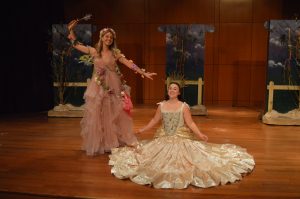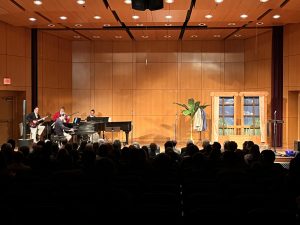![]() “How do I know what I think until I see what I say?” Dr. Alan Nordstrom often asks himself this question—originally posed by E.M. Forester—before writing a poem. Every morning, Nordstrom pours a cup of coffee, meditates or prays, and writes a sonnet.
“How do I know what I think until I see what I say?” Dr. Alan Nordstrom often asks himself this question—originally posed by E.M. Forester—before writing a poem. Every morning, Nordstrom pours a cup of coffee, meditates or prays, and writes a sonnet.
For over twenty years, he has performed this ritual as a means of tapping into his subconscious and uncovering stimulating thoughts buried deep within the folds of his mind. Part of the adventure of poetry for Nordstrom is the discovery of new ideas.
Reading classical poetry was the catalyst that first inspired Nordstrom to write his own. Great poems from the likes of William Shakespeare and Francesco Petrarch are Nordstrom’s greatest influences. He is inspired by the metrical rhythms and rigid forms that mold the rhyme schemes of these classic poems—he views them as guidelines to keep from wandering off on tangents. Nordstrom noted, “It’s a game . . . having a form to fill allows me to argue, debate, and exercise with the poem as I figure out how to navigate the form’s limitations and rules.”
Conquering this “game” can only be accomplished through practice, so Nordstrom suggests that students who wish to master poetry start early and write often.
Students should also read over examples of classic poetry and consider how they too can “play that game”. They should not only read these verses, but read them out loud and with fervor. Saying, as well as hearing, rhythms and rhymes drills patterns into the brain and allows words to come more readily when writing poetry.
For those who struggle with what to write about, Nordstrom’s greatest piece of advice is not to be afraid. Writer’s block is a form of anxiety; therefore, students must stop worrying and relax in order to beat it. Nordstrom also advocated the ancient advice “sleep on it”, as sleeping lets the unconscious do the thinking and makes the mind available to new ideas. When brainstorming, Nordstrom often looks to exterior sources or catalysts. He finds that personifying the muse is helpful, and he sometimes even converses with it.
Students often get caught up with perfecting rhyme schemes and meters on the first draft. This obsession binds students to their original rhyme scheme and forces them to use inadequate words simply because they rhyme. Instead, Nordstrom suggests, “Don’t be afraid of revision. You can always go back and change a word if you can’t find the proper word to rhyme with it.”
“Poetry is nothing but a fun game,” as Nordstrom said, so play around with it and have fun—but always remember to use a pencil.

Write Right: Dr. Nordstrom talks poetry
More from Arts & EntertainmentMore posts in Arts & Entertainment »






Be First to Comment